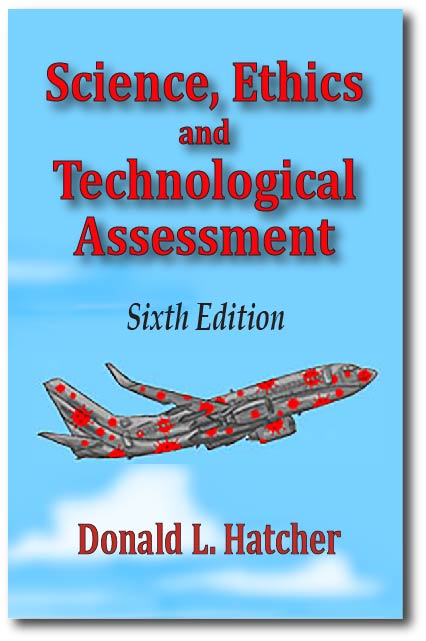Academic, Professional, Technical, Trade, Research Books & Journals
americanpress@flash.net • 617-247-0022 • 75 State Street #100 • Boston, MA 02109
Science, Ethics, and Technological Assessment
by DONALD L. HATCHER
6th edition 2021, 304 pages
ISBN 978-0-89641-603-1
$31.95 (includes shipping)
This is the 6th edition of Science, Ethics and Technological Assessment. In 1987, the first edition was designed to help the average citizen understand and evaluate some of the social and environmental issues brought about by scientific discoveries and modern technologies. This required that citizens understood both the nature and value of scientific reasoning, as well as well-established ethical theories. Only then could the assessment of various technologies and the related public policies be carried out intelligently.
Today, five editions later, not only are many of the same issues still with us, but the situation is even worse. Climate change, the COVID-19 global pandemic, drug-resistant bacteria, the growing destruction of natural habitats, crowding due to over-population, the accelerated extinction of numerous species, and the level of poverty in the world are all related to technology. The consequences of many of these issues are so great that citizens with a concern for the quality of life for future generations (their kids and grandkids) are left with no alternative but to understand the issues and become actively involved.
There are many books on the methods of science. There are many more on ethics. There is also a growing number on the social and environmental problems created by technology. This new edition of Science, Ethics and Technological Assessment integrates all three areas, giving the general reader an expanded and clearer understanding of both the methods of the sciences and the ethical frameworks necessary for intelligent policy decisions. Chapter One now includes a discussion of, not only the average citizen’s lack of scientific understanding, but the political forces that try to undermine the value science-based policy decisions. It also expands its treatment of the logic of the research in medicine and the social sciences. Chapter Two tries yet again to make the theories and the application of the ethics of Kant, Mill, Rawls, and Sartre absolutely clear to the average reader. Chapter Three focuses on new issues brought about by rapid technological change. A general goal is to make readers a bit skeptical about the introduction or use of any new technology. Just because we can do some things does not mean it is a good idea. Given its design, readers familiar with ethics and the logic of ethical decision making should learn a good deal about science and technological assessment, while scientists and technologists should learn a good deal about ethics.
CONTENTS
Chapter 1: UNDERSTANDING SCIENTIFIC REASONING
Is scientific literacy a moral duty?
On the nature and methods of the natural and social sciences
The challenge of radical relativism
Some further criticisms of the scientific approach to knowledge
Why scientific claims should have a privileged position in our belief systemsThe pragmatic success of science
What happens when scientists disagree?
Scientific explanations make the fewest assumptions
Scientific approach to knowlege is self-correcting
All claims and theories based on scientific inquity must be logically coherent
Some Problems with Science and Risk Assessment
Discussion Questions
Chapter 2: BRINGING CONSIDERATIONS TO PUBLIC POLICY DECISIONS
The importance of understanding normative and applied ethics
Some inadequate approaches to normative principles
Some logical problems with deriving ethical principles
Should fundamental ethical principles be grounded on religion?
Can civil laaw provide the foundation of ethis?
Are ethical principles simply relative?A quasi-Kantian approach to ethical values
Three additional approaches to ethical issues (Utilitarianism, Existential Ethics, Rawlsian Contract Theory)
Applying ethical theories
Values in conflict
Conclusion
Discussion Questions
Chapter 3: TECHNOLOGY: A BLESSING OR A CURSE?
Introduction
What is technology?
The symbiotic relationship between science and technology
Living in a technological world
The debate over technology
Some arguments in favor of technology
A few arguments against contemporary technology
The undesirable physical effects of techbnology
Technology and social justice
A few social and political consequences of a technological society
Some undesirablle psychologiclaeeffects of technology
The daunting tasks of technological assessment and control
Conclusion
Discussion QuestionsWORKS CITED
INDEX
ABOUT THE AUTHOR
Donald L. Hatcher is the Walter Bailey Chair of Humanities and Professor of Philosophy at Baker University in Baldwin City, KS. Besides numerous scholarly papers on critical thinking theory, pedagogy, and assessment, he is the author of Understanding the “Second Sex" (1985), Reasoning and Writing: From Critical Thinking to Composition (with Anne Spencer, 2006) and Logic for Critical Thinkers (in press 2020).